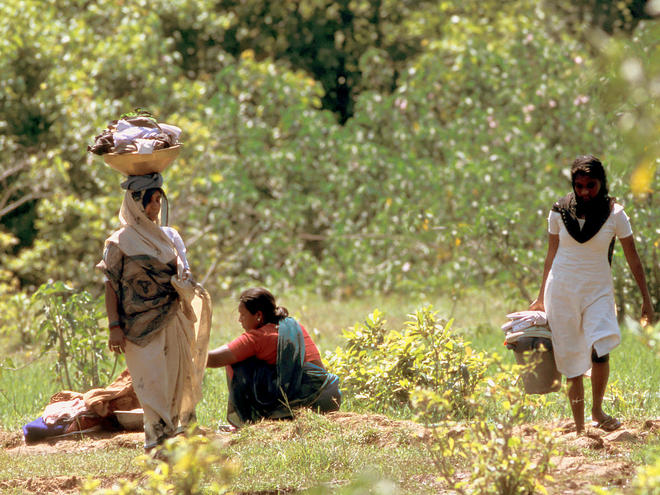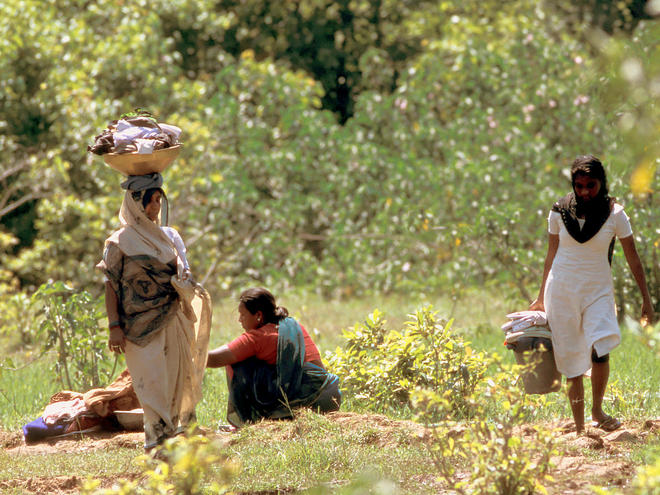Empowering women and families to build healthy communities and a healthy planet
Published by the World Wildlife Fund

If we collectively want to understand our planet’s mounting social and environmental challenges — and how we might solve them — consider Meeta’s story. Meeta is a young mother from India. Back-to-back pregnancies and heavy housework responsibilities took a toll on her health and wellbeing. Noting her declining health, a neighborhood social worker invited Meeta and her husband Ramkishore to participate in a CARE maternal health program that fostered open communication, education and access to family planning information. Through this program, Meeta told her story; it was a real eye-opener for Ramkishore.
Previously, Ramkishore had never shared the housework or cared for his daughter. In his community, helping with women’s work could leave a man open to ridicule. It resonated with him that these culturally-defined roles for men and women and, more specifically, closely spaced pregnancies, were undermining his family’s wellbeing. Ramkishore stepped up to help his wife around the house and became an activist to encourage other men to do the same.
In South Asia and many places around the world, women and girls are often responsible not just for carrying but also caring for children. Many women like Meeta do not have the power or the means to control when and how many children to have. 225 million women globally want to avoid pregnancy but don’t have access to effective methods of contraception. Without access to these basic services, women and their families face a difficult future — and our planet and its finite resources suffer, as well. The inability to plan and adequately space pregnancies leaves little time for women to manage the natural resources their families depend on.
But it doesn’t have to be this way. When women exercise their right to decide whether, when and how many children to have, women, their families, and the environment they depend on for sustenance is healthier.
Empowering men and women to plan their families gives them power over their own lives. The spacing of births — optimally at least two years apart — is a critical factor that influences women’s health and wellbeing, their ability to continue their studies, and to cultivate crops to nourish their families. It also enables women to take active roles in the long-term stewardship of the land, contribute to community-based natural resource management, and other activities that support healthy communities and a healthy environment. All of these add up to important contributions that reduce environmental degradation in developing countries, often the most biodiverse areas on the planet.
This affects all of us. Collectively, we are using and degrading our natural resources faster than they can regenerate. The planet provides natural resources and ecosystem services at a certain pace. When we take fish from the ocean faster than they can reproduce, we run out of fish. When rivers and aquifers are drained faster than they can recharge their water, they run dry. When we extract carbon from underground and release it into the atmosphere faster than our land and water can re-absorb that carbon, our planet heats up. If the planet is an investment that yields interest in the form of renewable resources, then August 8 — Earth Overshoot Day — marks the moment when we’ve run out of this year’s interest and must now spend down the principal, which we borrow from future generations.
Globally, the deficit is large and growing. Empowering women in developing countries to be environmental stewards is invaluable, because as this map of each nation’s ecological footprint shows, developing countries typically operate below natural resource budgets. As these countries become more affluent and populous, we need communities to do their part to ensure that our lands and rivers can support us for generations.
And just as CARE works with Meeta and communities like hers to keep their local environments healthy and thriving, WWF works with many of the world’s biggest businesses to improve the global production of commodities that affect forests, freshwater, oceans and the global climate. In partnership with these influential producers and buyers, we seek to create a world where markets operate within our planet’s natural limits.
The CARE-WWF Alliance draws on such local to global solutions to address the world’s most pressing challenges. You, too, can be part of the solution:
- Teach your children by example. Talk to them about the importance of responsible consumption and other ways of reducing your environmental footprint at home and in your community and raise awareness about Earth Overshoot Day.
- Share Meeta’s story. Meeting the unmet need for family planning protects and fulfills the rights of women and families, empowering them with the time and confidence to engage their communities in stewarding our planet’s finite resources.
Read the full article at: http://feedproxy.google.com/~r/WWFStories/~3/mj9xNQEXT7Y/empowering-women-and-families-to-build-healthy-communities-and-a-healthy-planet


